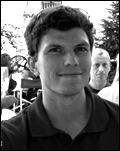
How do we learn that 2+2=4? John Stuart Mill (1806-72) philosophized on the empirical nature of mathematics, saying that a child experiences two physical objects and then another two objects before saying there are four of those objects. Parents and teachers usually grab for the first things they can find, be it pens, apples, coasters, or maybe even an abacus. But when can we start to crunch the numbers to do our tax forms, calculate China's birth rate, or figure out the ratio of ballots to seats in parliament? When can we go beyond the experience of counting physical things and make that leap of abstraction?
Platonists like to account for the learning of mathematics with this term, leap of abstraction. It gives us access to a world of ideas where perfect circles exist and reason alone leads to the truth. But critics have been quick to point out that this leap of abstraction is a very wishy-washy term, and have dismissed it as esoteric mysticism.
This problem of definition is not only characteristic of mathematics. It seems that every field of science has its unexplainable leaps and black holes. In the 1950's, for example, Noam Chomsky explained away a great deal of language learning by referring to a 'little black box' in the brain. Similarly, when Sir Isaac Newton was asked how he discovered gravity, he answered 'by thinking on it continually.' While he saw the same apples falling from the same trees as the rest of us, something intuitive enabled him of all people to relate it to orbital movement. But what was it?
In literature and religion we see similar 'leaps'. Evangelists, in their effort to convince non-believers of the strength of their religion, often refer to a 'leap of faith'. Many people are actually convinced by this argument, without asking what this 'leap' entails. In a similar fashion, Samuel Taylor Coleridge, explained reading fiction as a 'suspension of disbelief'. But is the recipe for appreciating fiction really this easy?
One must wonder what kind of 'thinking' Newton did to allow him to make such great discoveries. For if we could crack that code, we could all access great ideas, do complex arithmetic, or teach languages really efficiently. Literature teachers could hand students novels with a set of keys to unlock them, and students would automatically walk away saying, 'oh, now I get it.' A world like this, would be a world like Neo's from The Matrix, where any given set of skills, such as martial arts, could simply be downloaded from a common source and uploaded into the brain.
The question then is whether it is possible to put our finger on that moment of learning, identify it, measure it, and implement it. Or does learning require unexplainable, intuitive 'leaps' that are impossible to define?


No comments:
Post a Comment